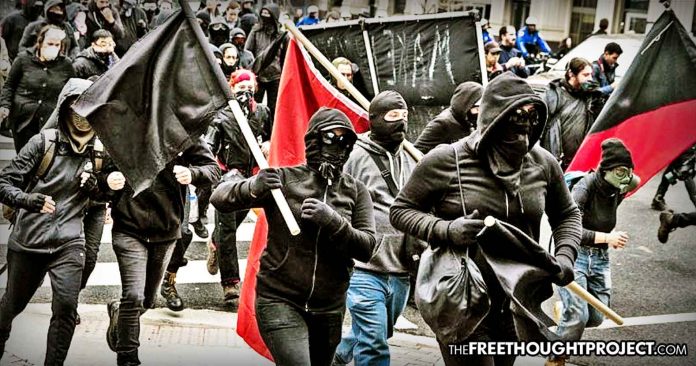Dear Antifa, Saying You’re Against Fascists Doesn’t Excuse Acting Like One
from The Free Thought Project:
 Despite claims that Antifa fights fascism, the group’s tactics actually mirror those of Benito Mussolini’s regime.
Despite claims that Antifa fights fascism, the group’s tactics actually mirror those of Benito Mussolini’s regime.
(FEE) On March 23, 1919, Benito Mussolini, an Italian veteran of the Great War and a publisher of socialist newspapers, created the Fasci di Combattimento (commonly known as the Fascist Party) with the help of a few syndicalist friends.
Nearly one hundred years later, the word fascism remains at the forefront of our political discourse even though fascism is all but dead as a political force, and the word has lost much of its meaning (if not its power).
So why are we still talking about fascists?
The Rise of Antifa
On November 8, the late-night TV host Stephen Colbert took to Twitter to condemn a mob that had attacked the home of Fox News host Tucker Carlson.
“Fighting Tucker Carlson’s ideas is an American right,” Colbert wrote. “Targeting his home and terrorizing his family is an act of monstrous cowardice. Obviously, don’t do this, but also, take no pleasure in it happening. Feeding monsters just makes more monsters.”
The attackers consisted of a group who called themselves Antifa. Few Americans had heard the word “Antifa” prior to 2016. But that’s no longer the case.
In addition to the attack on Carlson’s home, numerous high-profile incidents involving Antifa—the “Battle of Berkeley,” the tragedy in Charlottesville, and a series of street battles in Portland—have thrust the loosely organized political group into the national spotlight. (It’s difficult to miss gangs of black-clad individuals who wear masks, tote weapons, and pick fights with political opponents.)
Antifa, if you have not already guessed, is short for anti-fascism. Conduct a Google search, and you’ll see Antifa oppose fascist ideologies, people, and groups.
This is part of the brilliance of Antifa. Unlike most fringe political groups, Antifa is not named for something. Their name expresses opposition to an ideology, one that is at once vile and nebulous.
We’re All “Fascists” Now
More than seven decades ago, the British writer George Orwell observed that the term fascism had lost any coherent meaning.
“The word Fascism has now no meaning except in so far as it signifies ‘something not desirable,’” Orwell wrote in his essay “Politics and the English Language.”
Because of the ambiguous nature of the word, Antifa and other alt-left groups have been able to brand thinkers as diverse as Charles Murray, Christina Hoff Sommers, Jordan B. Peterson, and Ben Shapiro as “fascist.”
Moreover, by branding themselves as “antifascist,” Antifa inoculate themselves from the criticism that usually is directed toward extremist groups.
Colbert’s condemnation of Antifa’s attack on Tucker Carlson’s home notwithstanding, there has been a cultural reluctance to condemn Antifa’s political violence and tactics.
In 2017, following the tragic events in Charlottesville, which involved a showdown between white supremacists and Antifa members, former Republican presidential candidate Mitt Romney said it was wrong to equate fascists and anti-fascists.
“No, not the same,” Romney tweeted. “One side is racist, bigoted, Nazi. The other opposes racism and bigotry. Morally different universes.”
Fascists and Antifa: Not as Different as You Think
Romney expressed a common belief, but Antifa is hardly the polar opposite of fascism. An examination of Antifa and the fascists of the 1920s and 1930s reveals striking similarities.
Many historians and political writers describe fascism as a right-wing movement, and the claim has an element of truth to it. When Mussolini and his syndicalist friends created the Fasci di Combattimento, it’s true they embraced Italian nationalism. Yet the party also called for the seizure of church lands, the confiscation of finance capital, and the abolition of the Italian monarchy and Senate.
In fact, Mussolini was an ardent Marxist for years. The son of a socialist-anarchist craftsman, he was well-versed in the works of Karl Marx, whom he praised as “a magnificent philosopher of working-class violence.” The extent to which Mussolini’s fascists simply copied their socialist predecessors has often been overlooked.
In his magnum opus Modern Times, the historian Paul Johnson explains that Mussolini was highly influenced by Kurt Eisner, who was cited several times in Mussolini’s fascist programme. Eisner’s “Bavarian fighting squads,” which inspired Mussolini’s Fasci di Combattimento, were themselves inspired by Lenin’s “men in black leather jerkins,” Johnson points out. Mussolini’s use of the term “vanguard minorities” to describe the shock troops of his revolution was almost certainly inspired by Lenin’s “vanguard fighters” (a term Lenin first used in 1903).
Read More @ TheFreeThoughtProject.com
Loading...


